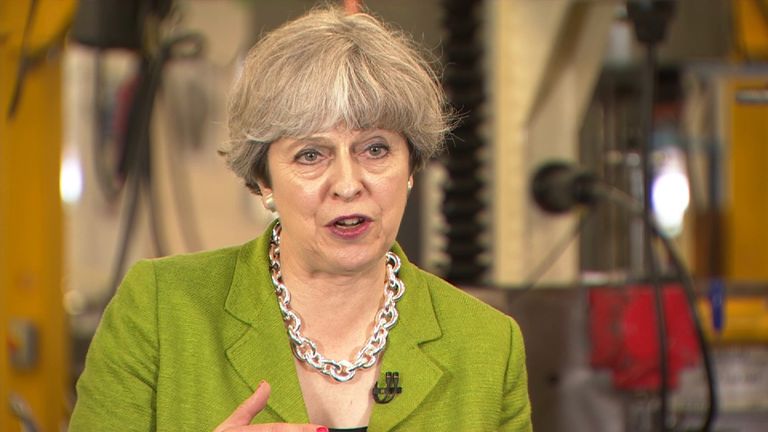General Election: Five key seats to watch in 8 June poll
Can the Conservatives gain in Scotland, will Labour dominate in Wales and what will be the fate of the Lib Dems, UKIP and Greens?
Thursday 1 June 2017 21:28, UK
The 2017 General Election will be remembered by history as the Brexit election.
But the overall story will be woven from a range of sub-plots that will play out across the 650 parliamentary constituencies that determine the outcome.
Will Theresa May's gamble to increase her majority backfire if Labour puts aside its internal divisions and performs better than anyone expected mere weeks ago?
Can the Conservatives roll back the years of famine in Scotland and re-establish a parliamentary presence there?
A similar battle will be waged in Wales but here Labour is still the preferred choice of most voters.
Then there is UKIP's and the Liberal Democrats' fate to be settled.
Last time, more than one in eight voters chose to follow Nigel Farage's lead. Many of those voters have deserted, it appears, but will it be Labour or the Conservatives that has appeal?
The Liberal Democrats have gone for broke with their Remain strategy - appealing to the almost half of the voters that wanted to stay inside the EU with the promise of another referendum.
There are five key seats that taken together address these themes.
The outcome in each will determine whether the Brexit election will be remembered as a brilliant tactical gambit by a new and inexperienced Prime Minister or a reckless and futile attempt to strengthen our hand in the negotiation with Europe.
:: Middlesbrough South and East Cleveland
One of the first to declare himself out of the 2017 election was Tom Blenkinsop, Labour MP of the Middlesbrough South and East Cleveland constituency since 2010. A vocal critic of Jeremy Corbyn, he supported his rivals at the two leadership elections.
His decision not to contest the seat is symptomatic of the deep divisions that have undermined Labour for years. The critics say he jumped before the voters pushed him out of office given his slender 2,000 vote majority.
The Conservatives need a swing of just 2.5% and the seat lies 21st on its target list. Success here should see Theresa May pass the 50-seat majority milepost.
:: Berwickshire, Roxburgh and Selkirk
An easier, although symbolically important, Conservative target is the delightfully named Berwickshire, Roxburgh and Selkirk which nestles in the Scottish borders.
This was seized by the SNP from the Liberal Democrat incumbent in the drama of the 2015 election.
But it is the Conservatives that lie a mere 328 votes short of the winning line.
Each Conservative gain in Scotland has a disproportionate impact on the fate of the 'Scottish question'.
The 1997 general election saw the Conservatives wiped out in Scotland and since then they have only ever held one constituency. Gaining Berwickshire and other seats will give credence to the Conservative claim to represent the union.
:: Bridgend
A Conservative advance in Leave-voting Wales is also an important part of the Brexit mandate. Bridgend tops the target list where a swing of 1,000 voters from the Labour to Conservative column tips the balance.
Used to winning over half the votes here, Labour has watched its buffer-zone erode.
In 2015, the Conservatives unexpectedly won the seat of Gower by just 27 votes. Should that return to Labour, then Bridgend would be the compensation the Conservatives need.
:: Walsall North
At the 2015 election, UKIP's Elizabeth Hazell secured over 8,000 votes in Walsall North. That might not sound a lot but it represented more than one in five of the votes cast in the constituency won by Labour's David Winnick.
This is another Conservative target that if won lifts the majority to 'comfortable' rather than 'impressive'.
Wooing more UKIP voters than Labour is the key Conservative strategy both here and across other marginal constituencies in the Midlands.
:: Kingston and Surbiton
As UKIP tumbles, the Liberal Democrats recover. Or so we were led to believe. So irate were Remain voters that they would easily fall into line behind the party that promised another go at answering the Europe question.
A trio of knights of the realm, Sirs Vince, Simon and Ed would lead the charge, re-gaining the ground lost spectacularly in 2015.
The Liberal Democrats have set their stall out to re-conquer south-west London which includes Ed Davey's former seat of Kingston and Surbiton. Ousted by 3,000 votes, Mr Davey now hopes to turn the tables on Conservative James Berry.
Unlike in Richmond Park and Twickenham, however, the Green party is contesting the seat. In a close finish, this leakage of anti-Conservative voters could be crucial.







